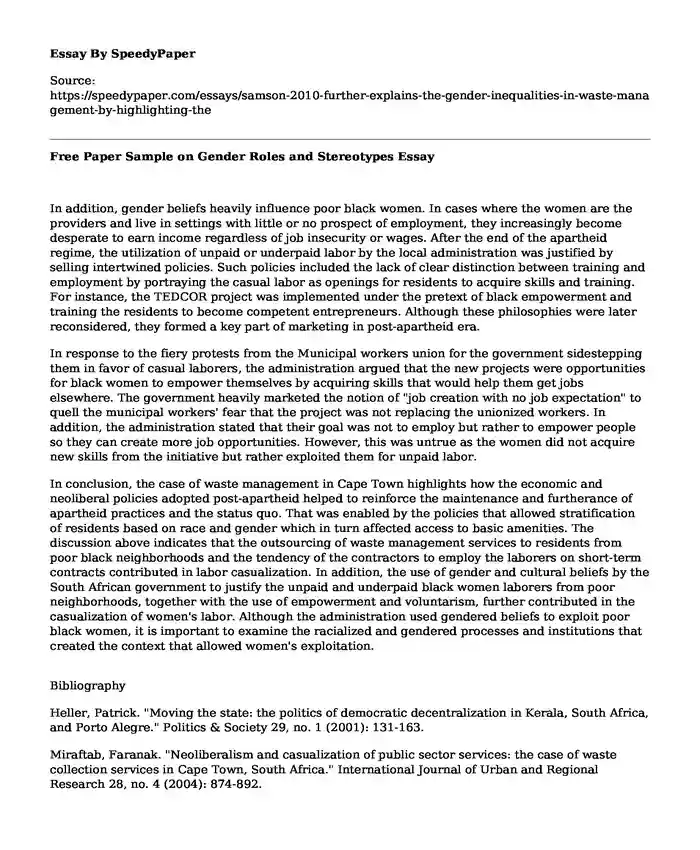
| Type of paper: | Essay |
| Categories: | Government Nature Development |
| Pages: | 2 |
| Wordcount: | 537 words |
In addition, gender beliefs heavily influence poor black women. In cases where the women are the providers and live in settings with little or no prospect of employment, they increasingly become desperate to earn income regardless of job insecurity or wages. After the end of the apartheid regime, the utilization of unpaid or underpaid labor by the local administration was justified by selling intertwined policies. Such policies included the lack of clear distinction between training and employment by portraying the casual labor as openings for residents to acquire skills and training. For instance, the TEDCOR project was implemented under the pretext of black empowerment and training the residents to become competent entrepreneurs. Although these philosophies were later reconsidered, they formed a key part of marketing in post-apartheid era.
In response to the fiery protests from the Municipal workers union for the government sidestepping them in favor of casual laborers, the administration argued that the new projects were opportunities for black women to empower themselves by acquiring skills that would help them get jobs elsewhere. The government heavily marketed the notion of "job creation with no job expectation" to quell the municipal workers' fear that the project was not replacing the unionized workers. In addition, the administration stated that their goal was not to employ but rather to empower people so they can create more job opportunities. However, this was untrue as the women did not acquire new skills from the initiative but rather exploited them for unpaid labor.
In conclusion, the case of waste management in Cape Town highlights how the economic and neoliberal policies adopted post-apartheid helped to reinforce the maintenance and furtherance of apartheid practices and the status quo. That was enabled by the policies that allowed stratification of residents based on race and gender which in turn affected access to basic amenities. The discussion above indicates that the outsourcing of waste management services to residents from poor black neighborhoods and the tendency of the contractors to employ the laborers on short-term contracts contributed in labor casualization. In addition, the use of gender and cultural beliefs by the South African government to justify the unpaid and underpaid black women laborers from poor neighborhoods, together with the use of empowerment and voluntarism, further contributed in the casualization of women's labor. Although the administration used gendered beliefs to exploit poor black women, it is important to examine the racialized and gendered processes and institutions that created the context that allowed women's exploitation.
Bibliography
Heller, Patrick. "Moving the state: the politics of democratic decentralization in Kerala, South Africa, and Porto Alegre." Politics & Society 29, no. 1 (2001): 131-163.
Miraftab, Faranak. "Neoliberalism and casualization of public sector services: the case of waste collection services in Cape Town, South Africa." International Journal of Urban and Regional Research 28, no. 4 (2004): 874-892.
Moore, David. "Neoliberal globalisation and the triple crisis of'modernisation'in Africa: Zimbabwe, the Democratic Republic of the Congo and South Africa." Third World Quarterly 22, no. 6 (2001): 909-929.
Samson, Melanie, and Karen Hurt. Dumping on women: gender and privatization of waste management. South African Municipal Workers' Union (Samwu), 2003.
Samson, Melanie. Producing Privatization: Rearticulating Race, Gender, Class and Space. Antipode 42, no. 2 (2010): 404-432.
Valodia, Imraan. "Economic policy and women's informal work in South Africa." Development and Change 32, no. 5 (2001): 871-892.
Cite this page
Free Paper Sample on Gender Roles and Stereotypes . (2023, Feb 21). Retrieved from https://speedypaper.net/essays/samson-2010-further-explains-the-gender-inequalities-in-waste-management-by-highlighting-the
Request Removal
If you are the original author of this essay and no longer wish to have it published on the SpeedyPaper website, please click below to request its removal:
- Causes of Poverty Disclosed in Our Free Essay Example
- Kentucky Fried Chicken (KFC) in Saudi Arabia - Free Essay Example
- Free Essay on the Significance of Sexual Education to Young Adults
- Business Essay Sample: IKEA Five-Year Financial Plan
- Free essay: The Portrayal of Indigenous People in the Media
- Pathway to Safer Opioid Use - Paper Example
- Free Essay. Applied Behavioral Analysis in Public Schools
Popular categories




